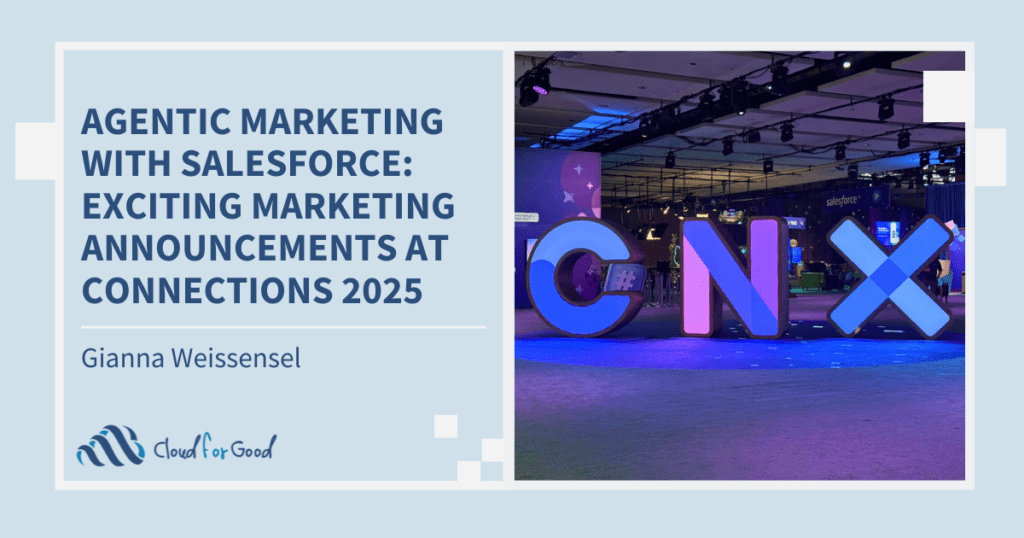At what point does managing your volunteers with a paper-laden process become unmanageable? Is it when your organization has thousands of volunteers servicing members all over the community? Or is it when you complete over, 500,000 service hours each year? For many organizations, data collection and reporting are daunting and time-consuming tasks that can take precious hours a month to log and organize.
While attending Dreamforce 2019, I had the opportunity to present alongside Alia Winters, the Vice President of Digital Strategy at Community Service Society. We shared how we implemented Community Cloud to log volunteer time, giving back hundreds of hours to the volunteer managers at the Community Service Society.
Community Service Society
The Community Service Society (CSS) was formed in New York City in 1939 as the result of a merge of two service agencies, The New York Association for the Improvement of the Condition of the Poor and the Charity Organization Society. From the very beginning, Community Service Society has been devoted to tackling some of the most difficult issues in New York City using innovative and data-based methods.
Today, this organization strives to identify all factors that result in a permanent poverty social class in New York City, and “advocate the systemic changes required to eliminate such problems.” CSS also focuses on empowering impoverished people and families throughout the city to ensure they reach their full potential and have access to both political and economic opportunities. To do so, the managers and volunteers at CSS campaign for better job opportunities, policies or programs that will provide economic security, and inclusive healthcare reforms.
In the mid-1960s, Community Service Society founded and implemented a small community service program called, Retired and Senior Volunteer Program (RSVP), on Staten Island. This program strives to mobilize older citizens to give back to their communities after retirement. Today, RSVP is run and regulated by the Corporation for National and Community Service (CNCS), however, CSS still manages and operates the New York City chapter. RSVP has mobilized over 2,300 volunteers, all of whom are 55 years or older. CSS requires all the senior volunteers to undergo an interview process followed by comprehensive training to ensure volunteers are perfectly matched with their service sites. Some of the service sites include soup kitchens, hospitals, community centers, and senior care centers. Together, the New York City volunteers provide over 500,000 service hours every year.
Over 100 Hours of Lost Time a Month
Prior to implementing Community Cloud, RSVP managers manually tracked all service hours using paper timesheets. Every month these timesheets were electronically generated and then printed, which could take more than 2 hours to complete. After the sheets were printed, two or three full-time staff members would spend a day and a half checking over the sheets, reviewing for accuracy.
Once this step was completed, the managers would compile the sheets and send them off to the 300 different work sites located throughout the city. Getting the timesheets back was an extremely difficult task for those at CSS. The managers would often follow-up multiple times with the site coordinators, requesting the completed timesheets. Deadlines were frequently missed and, many completed sheets were sent-in via hand-written fax that could be difficult to understand. This required the managers at CSS to spend hours deciphering handwriting as they re-entered the data into their legacy system. Due to this inefficient, and dated method of collection, the data was wildly inaccurate. Recorded volunteer hours are the most important metric that must be reported back to the Corporation for National and Community Service and RSVP funders. In addition, volunteer hours fund the recognition programs that are used to keep the senior volunteers motived and excited about their work.
CSS knew those paper timesheets were a weak point in their RSVP program, so, they partnered with Cloud for Good to implement an efficient solution to the issue at hand – Community Cloud.
Implementing Community Cloud
Making the decision to greatly reduce human error and increase efficiency was a no-brainer for CSS. After an extensive business process review, Cloud for Good built around the Volunteers for Salesforce package to create a custom program based on the specific needs of the Community Service Society. This included creating a custom Timesheet object as the master record to track the volunteer time. We created custom automation to send email alerts to the site coordinators when their timesheets were ready to be completed. If the site coordinator did not complete the timesheet by the specified due date, they would receive follow up reminders. In addition, we used Visual Force to create an easy to use data entry screen that allowed site coordinators to enter completed volunteer hours. The data entry screen preloads a list of all active volunteers assigned to the specific site, so all coordinators need to do is find the volunteer name and enter the number of hours worked. The coordinators can also remove volunteer names if need. Finally, we configured a Salesforce community that provided site coordinators authenticated access to the timesheets in a safe and secure environment. By using a Community, CSS could guarantee that only authorized users could access the system and they would be able to view only their data.
By implementing an electronic time and data entry system, the RSVP program staff could double the time focusing on the actual program rather than data entry. With this new application, paper timesheets are no longer printed, physically reviewed and delivered across New York City. A much simpler time entry system, combined with email reminders, has dramatically reduced missed deadlines. And the RSVP team no longer re-enters 2,500 lines of data from over 300 sheets of paper. The RSVP team has calculated that the new system saves them 100 hours of work a month compared to their previous process.
Not only has this implementation been supported by the internal staff at Community Service Society, but many of the site coordinators also love the new electronic time entry system. The following are quotes from site supervisors:
“From a supervisor standpoint, the new timesheets are super simple. Thank you for making the change!”
Shannon C. Smith, new York Presbyterian / The Allen Hospital
“The electronic timesheet was easy onceI read the instructions. If I can understand them, that means they are very good!”
Jeanine Poggiolo, Brooklyn Botanic Garden
Dreamforce 2019 Presentation
Overall, implementing Salesforce at Community Service Society has significantly increased efficiency and accuracy regarding data input. The Community Cloud has also given managers back hundreds of hours each month. With these hours the managers can now focus on sustaining and improving the program rather than stressing about data input. The managers at CSS can quickly pull reports and send accurate data back to the CNCS, without worrying about errors or incomplete data. Finally, the communication stream has improved significantly with the automated timesheet reminder messages that are sent to site managers. For more information about this implementation process, check out our presentation on the Dreamforce website!





